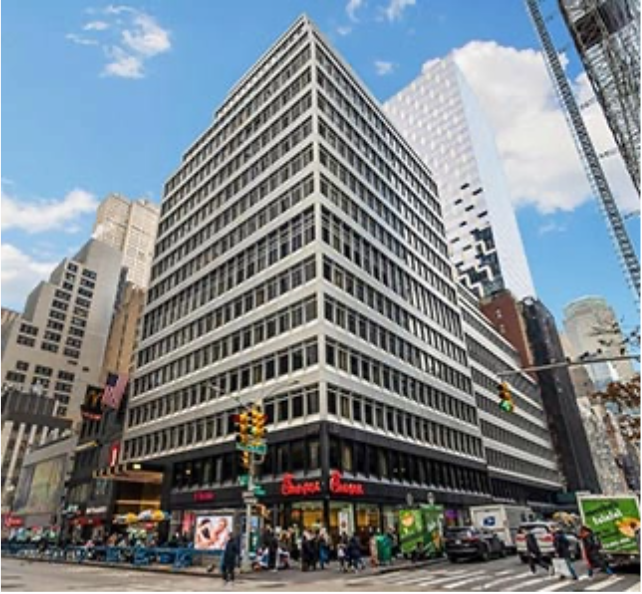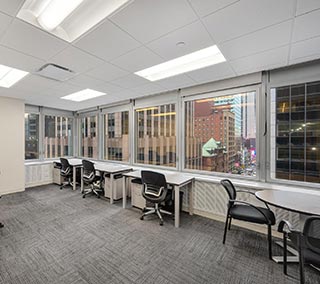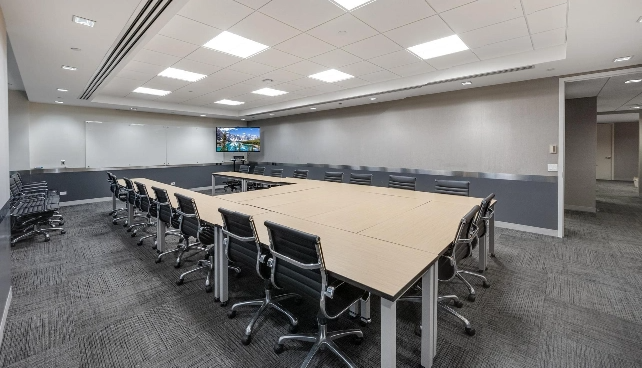There are a number of different types of coworking spaces. Some are used by small businesses while others are designed for individuals and entrepreneurs, but all are meant to serve as shared workspaces that do not require the same level of commitment of a traditional office lease.
What Defines a Coworking Space?
A coworking space is defined as a shared workspace that is rented for predefined periods of time by individuals and groups. A coworking space is shared by multiple members, tenants or occupants simultaneously. Some coworking spaces may cordon off sections or desks for groups of members for an allotted period of time per day, per week or per month, but common areas typically remain shared spaces.
Various Types of Coworking Spaces
In order to cater to the many different types of businesses, industries and workers in the modern economy, coworking spaces are available in a number of different types. Below are some common ways coworking spaces are divided:
Traditional Coworking Spaces
A traditional coworking space is a shared workspace that may be rented by professionals from various companies and industries. These types of coworking spaces may provide dedicated areas where individuals and companies can work in addition to common areas shared by all members.
Niche/Vertical Coworking Spaces
A niche coworking space caters to one type of vertical. This means that all members of such a coworking space belong to a particular type of industry or professional specialization.
Corporate Coworking Spaces
Corporate coworking spaces are shared workspaces occupied by corporations. These spaces are often utilized by large companies that need temporary workspaces when a part of their workforce is conducting business away from a company’s headquarters or in an area where the company has no offices.
Remote Worker Hubs
Remote worker hubs cater to the needs of remote workers and often feature amenities like high-speed Internet access and VoIP connectivity software and hardware.
University-Based Coworking
University-based coworking spaces are used by students but may allow some non-student professionals into the spaces. They are often reserved for student project collaboration but can sometimes be used by student workers who need a workspace for commercial purposes.
Independent Coffee Shop Coworking
Independent coffee shops and some chains have dedicated coworking spaces set up that allow individuals and small groups of professionals to conduct business inside the shop. These spaces often offer amenities like WiFi, and some may provide discounts on coffee and snack items based on the coworking space arrangement.
Coworking Chains/Franchises
Coworking chains or franchises are standardized coworking spaces that often have multiple locations. Members can utilize these spaces in one or more locations, and amenities are generally the same from space to space.
Part-Time Coworking Spaces
Part-time coworking spaces provide workspaces that are used in shorter intervals or increments compared to full-time coworking spaces. Some part-time coworking spaces rent space by the hour or in four-hour blocks.
What to Look for When Choosing a Coworking Space
When looking for a coworking space, there are a number of factors to consider as not every coworking space is right for every entrepreneur or business. Below are some considerations when choosing a coworking space:
Location
You will usually want to look for a coworking space that is located close to your home but that is also situated in an area where you do business. Convenience is the biggest factor here, and this is especially important if you plan to meet with others in a coworking space.
Cost and Flexibility
The cost and flexibility of terms provided by your coworking space should also be considered. In general, coworking spaces that are located in larger metropolitan areas and offer a large number of amenities will cost more than those located in suburban or rural areas. The rental terms of a coworking space can vary as well with some spaces requiring long-term agreements and others offering short-term space rentals.
Transparent pricing structure
You will want to look at the pricing structure of any coworking space you are considering to take note of transparency. Most entrepreneurs and business owners will want to find coworking spaces that provide upfront, transparent pricing.
High-speed internet
High-speed Internet access is vital for the majority of entrepreneurs and business owners who utilize coworking spaces. It’s a good idea to check with any coworking space you’re considering to see if the space provides access to high-speed Internet, and if so, if this access is free or requires a fee.
Printing and scanning facilities
Access to printing and scanning equipment in a coworking space can be beneficial for business owners and entrepreneurs who work with physical documents. Some coworking spaces provide the use of printers and scanners, but a per-document fee may apply.
Meeting rooms and private offices
While all coworking spaces function as shared workspaces, some offer access to dedicated meeting rooms that can be reserved or private offices that can be rented. Meeting rooms may be available via a sign-up sheet, and private offices may be available for an additional fee on top of the coworking space membership fee.
Kitchen and refreshment facilities
Kitchen and refreshment facilities located inside coworking spaces can be areas where members are able to store food items and prepare light meals. Some kitchens include refrigerators that are shared by all members as well as countertops and tables. Vending machines may also be available inside of refreshment facilities.
Community and Networking
Many coworking spaces offer the opportunity to network with other members. This can be particularly helpful in niche or vertical coworking spaces where all members belong to specific industries.
Networking events and opportunities
Networking events can be used to connect with other members, form business partnerships and expand networks but should not be used to sell products and services.
Collaboration spaces to foster interaction
Collaboration spaces are shared spaces where members of a coworking space can come together to discuss ideas, utilize shared tools like whiteboards and smartboards and interact with one another in a professional space. Collaboration spaces may be shared by all members or may be reserved for specific groups for periods of time.
Workspace Design
The design of workspaces in a coworking office is an important consideration and should be measured against how each member works best. Some coworking spaces feature an open-office floor plan which can be good for entrepreneurs and business owners who want to collaborate openly with others. These designs may not work for members who prefer quiet and privacy.
Comfortable and ergonomic furniture
Comfort and ergonomics can be important factors when looking for a coworking space that supplies office furniture. Trying to get work done in an uncomfortable environment can diminish productivity, so it’s a good idea to get a feel for the office furniture supplied by a coworking space before signing an agreement to become a member.
Adequate lighting and ventilation
Trying to work in a space that has poor lighting and bad air quality can hurt productivity, so you will want to look for a coworking space that provides adequate lighting and ventilation. Some coworking spaces may allow members to use small desk lamps brought from home, but most prefer members to only utilize provided equipment to avoid distracting others.
Flexibility in workspace layout
Many professionals who use coworking spaces are doing so in an attempt to grow businesses, meaning it’s important to have flexibility in your workspace layout in a coworking space. The ability to add team members or expand a workspace can be important for future growth.
Technology Infrastructure
Your coworking space should have a solid technology infrastructure in place if you plan to use the space for communication, computer-based applications, Internet activities or other work that relies on technology. This infrastructure should accommodate the electrical requirements of your equipment as well as the networking bandwidth to handle the flow of data required to get work done.
Reliable tech support
If your coworking space provides technology or access to computer networking, you will want to make sure the space provides access to reliable tech support during operating hours to handle any questions or concerns that arise as they pertain to your usage of provided technology.
Charging stations and power outlets
Charging stations and power outlets are important if you plan to use any type of electrical equipment in a coworking space. Access to standard power outlets along with USB charging can be vital for keeping your electronics powered during a work session.
Security
A coworking space should also have various forms of security in place to protect members, their belongings and their data. If physical security is not present on-site at a coworking space, security cameras and access control systems may be sufficient.
Data privacy and protection
In addition to physical security, data protection is an important factor to consider when looking for a coworking space. Your coworking space should have various forms of network protection for all shared Internet, and any provided intranet access should also have data security protocols in place.
Community Culture
You will want to evaluate the community culture of any coworking space you are considering. Community culture can be influenced by location, but the type of coworking space you are considering may also factor into defining community culture.
Hours of Operation
It’s a good idea to consider the operating hours of a coworking space before becoming a member. Some coworking spaces operate 24 hours a day, but others only operate between set hours. You will also want to consider whether weekend hours are possible if this is something that is important to your professional aspirations.
Feedback and Reviews
Before becoming a member of a coworking space, it would be a good idea to look online to read reviews and see feedback from current and previous members. This information can give you an inside look at how members feel about their experiences, but remember that some reviews can hold bias.
Additional Services
Coworking spaces vary across the country and the world, and some offer additional services aside from those provided by a standard coworking space. Take into consideration these additional services and compare them against your needs.
Trial Period
You should see if a coworking space offers a trial period before requiring membership. A trial period may be free or discounted, but this period can give you a chance to test out the space to see if it’s right for your needs.
Scalability
The scalability of a coworking space can be important if you plan to grow your business. In some cases, you can add extra space, desks or offices to a membership at a coworking space.
Sustainable and eco-friendly practices
If sustainability and environmental awareness are important to you or your business, look for a coworking space that engages in sustainable initiatives like recycling or smart energy usage.
Parking Facilities
If you drive to a prospective coworking space, take a look at available on-site or nearby parking facilities. You will want to be able to park in a nearby space that has adequate lighting and is monitored by security cameras if possible.
Health and Wellness
Some coworking spaces offer health and wellness facilities and initiatives. These can be beneficial for your personal health and can be attractive offerings for employees if you plan to have them use a coworking space as well.
Frequently Asked Questions
What type of industry is coworking space
Professionals from different industries use coworking spaces as alternatives to traditional office spaces.
What is the purpose of a coworking space
The purpose of a coworking space is to provide a shared workspace that fosters collaboration and networking.
What is the difference between co sharing and co working
A co-sharing workspace only allows one individual or one business to occupy a workspace at a time. A coworking space sees multiple individuals or businesses occupying a workspace at the same time.
Who needs coworking spaces
Entrepreneurs, small companies, startups and remote teams are examples of entities that need coworking spaces.
Who is the target market for coworking spaces
The target market for working spaces generally consists of entrepreneurs, startups and larger companies that need workspaces for remote teams.
What is the future of coworking spaces
The future of coworking spaces is bright as many professionals believe that remote work will continue to grow as Internet technology evolves and advances.
What is the difference between hot desking and coworking
Hot desking allows an individual to rent a desk for a certain period of time. Coworking is an arrangement in which multiple individuals or businesses occupy a workspace at the same time.
What is the minimum space for a coworking space
There is no minimum space for a coworking space. The limitations of a coworking facility’s physical space are defined by how many people need to be in an area at one time and how many can safely occupy a space simultaneously.
Why do coworking spaces fail
Coworking spaces fail for a variety of reasons, but mismanagement, poor pricing and bad locations tend to be the most common factors that lead to failure.
Which is the world’s largest coworking space
Currently, BHIVE Workspace HSR Campus is the largest coworking space in the world with over 8,000 seats available.
What makes the best coworking space
Some factors that define the best coworking spaces include a good location, access to amenities and a welcoming workspace culture.
What makes a coworking space unique
Coworking spaces can differentiate themselves by decorating the interior of workspaces in unique ways, offering amenities that other coworking spaces do not offer and catering to members in niche industries.
How do you create a coworking space
To create a coworking space, you will need to check with your local city, county or state business regulations. You may also need to check with local health and safety officials if you plan to allow members onto the premises.
Looking for an office in the city? Corporate Suites offers furnished office spaces, virtual offices & conference rooms in several prestigious locations across New York City.






